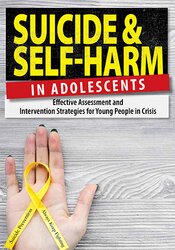

Young people are dying. Alone and afraid.
Hanging, overdoses, slashed wrists. Young, horrific, unnecessary deaths. The human toll is staggering. The suffering devastating. Promising futures erased. Heart-broken parents aching to hold their children one last time. Desperate adolescents feeling isolated and unloved in their inner lives often wear a mask of strength. Terrified of hospitalization and stigma if they share their true feelings, they face a lonely and frightening battle.
You are the one working with them. The one trying to prevent this. The one who’s supposed to help this kid get better. Is there something I’m missing? Could I be doing more? How do I manage my liability?
You feel the weight of keeping someone alive. Being the one expected to prevent a suicide can be a heavy burden. There’s nowhere to hide from the responsibility and fear - or the guilt that could come if something happens.
But fear won’t steer you away. You won’t let them face it alone.
Be prepared to offer these kids guidance and hope.
Dr. Tony Sheppard is a licensed psychologist and certified group psychotherapist who has trained hundreds of clinicians, educators, and medical professionals in the treatment of self-harm and suicidal ideation. In more than 15 years of working with children, adolescents, and young adults, Tony has uncovered the specific tools and techniques you need to help your young suicidal and self-harming clients.
Watch this essential seminar and walk away with:
Join Tony as he weaves his expertise and compassion into the practical skills you need to guide these kids out of the darkness back into the light!
This online program is worth 6.25 hours CPD.
| File type | File name | Number of pages | |
|---|---|---|---|
| Manual 053365 (29.84 MB) | 154 Pages | Available after Purchase |

Tony Sheppard, PsyD, CGP, ABPP, AGPA-F, specializes in treating young people suffering from psychiatric issues including self-harm and suicide. A licensed psychologist and certified group psychotherapist, Tony brings over 20 years of experience working with children, adolescents, and young adults to his clinical practice. In addition to his private practice, Groupworks, he has trained hundreds of clinicians, educators, nurses, and physicians across the country in the treatment of self-harm and suicide and is the author of a training curriculum in group psychotherapy. He is board certified in group psychology.
Tony’s clinical approach draws from interpersonal neurobiology, Dialectical Behavior Therapy, solution-focused brief therapy, Cognitive Behavioral Therapy, and positive psychology. His creative and interactive delivery style will draw you into the dire nature of youth suicide and self-harm and have you leave feeling confident and prepared to handle this most important work.
Speaker Disclosures:
Financial: Dr. Tony Sheppard is the founder and director of Groupworks Psychological Services and has an employment relationship with Spalding University. He receives royalties as a published author. Dr. Sheppard receives a speaking honorarium and recording royalties from PESI, Inc. She has no relevant financial relationships with ineligible organizations.
Non-financial: Dr. Tony Sheppard has no relevant non-financial relationships.
Please Note: PESI is not affiliated or associated with Marsha M. Linehan, PhD, ABPP, or her organizations.
| 5 |
|
| 4 |
|
| 3 |
|
| 2 |
|
| 1 |
|
Satisfaction Guarantee
Your satisfaction is our goal and our guarantee. Concerns should be addressed to info@pesi.co.uk or call 01235847393.
Please wait ...